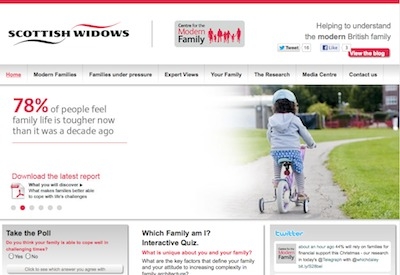One in five Britons is being forced to borrow money from relatives to help them buy Christmas presents. In addition, almost half (44%) will receive some kind of financial assistance from their families to see them through the holiday period, according to new research from Scottish Widows think tank Centre for the Modern Family.
Not only will relatives be joining forces to help foot the bill for this year's festivities, but the majority of people plan on spending the festive season with their families, keeping alive the traditional British family Christmas.
However, far from being wrapped up in themselves, families are throwing their doors open to others with more than 1 in 10 people planning on sharing the festivities with friends.
Centre for the Modern Family panellist and Head of Which? Money James Daley, said: "We know that Christmas is a difficult time, with pressures on the family purse strings colliding with winter fuel bills, the cost of entertaining and what can seem like a long wait between pay-days.
"If people are finding it tough to cope, it's far better to seek advice from a debt charity or support from family and friends, than to risk further difficulties by taking out too much debt or using a pay day loan."
On Christmas Day itself, the vast majority of people (79%) open Christmas presents, while half (43%) watch Christmas specials on TV and one in five tune into the Queen's speech. One in five families don't leave the house at all on Christmas Day.
The traditional idea of Christmas dinner continues to be a major part of the day for the majority of families. While almost two thirds (61%) of us have our main meal at lunch time, 15% eat in the evening and 8% choose to have Christmas brunch instead. Almost one in twenty (4%) will eat Christmas dinner in a restaurant this year, while 6% are heading to the pub for a drink - nearly as many as who will attend Church on Christmas Day (7%).
Arguments are also part of Christmas Day for one in 20 people, with the younger generations more likely to argue with family members - 8% of 18-24 years and 25-34 years olds admit to Christmas Day conflict, compared to just 2% of those aged over 55.
Reflecting on the findings, Centre for the Modern Family panellist and head of Relate Professor Cary Cooper says:
"We all know that Christmas is about much more than presents and decorations, and it's heartening to see that families are pulling together to meet the pressures which Christmas can place on families.
"For many people, Christmas represents the time of year when we can really spend time with those we love, which is why so many of these Christmas rituals remain intact. Without our usual routines and considering the huge pressure placed on these few days, it's not surprising the season can be a little stressful, but it's important to remember how much our family and friends mean to us and to be careful to take a deep breath when things feel difficult."
{desktop}{/desktop}{mobile}{/mobile}
The Centre for the Modern Family aims to improve the understanding of the challenges facing British families, by providing insight and perspectives for Government, businesses, media, communities and faith groups to help improve family lives.
Established by Scottish Widows in November 2011, the Centre has produced in-depth research with families across the country.

